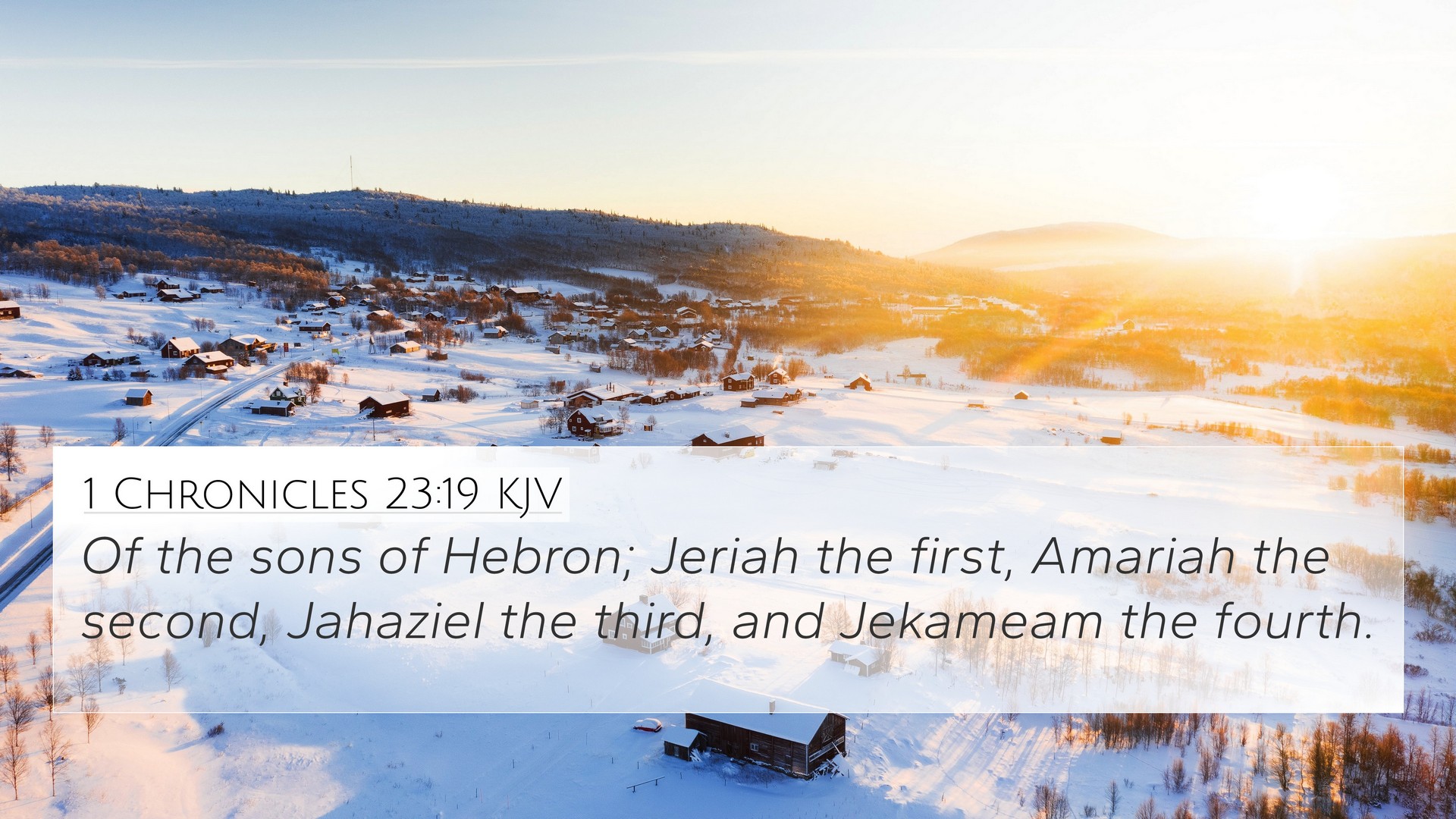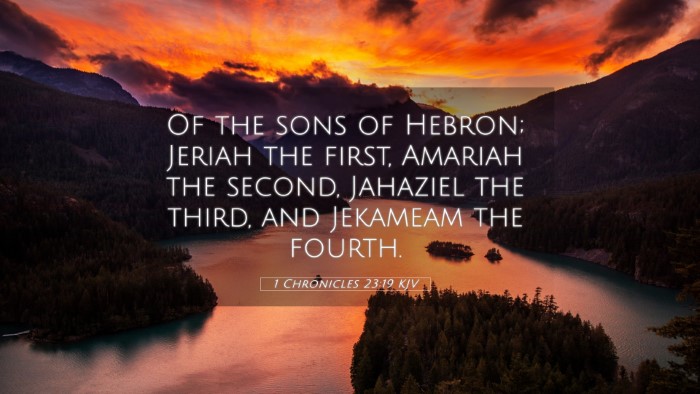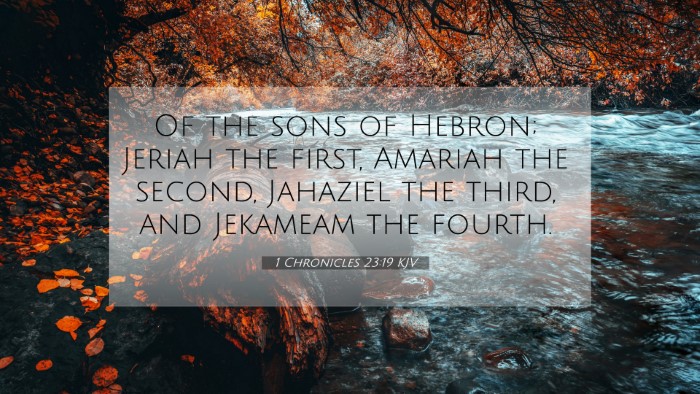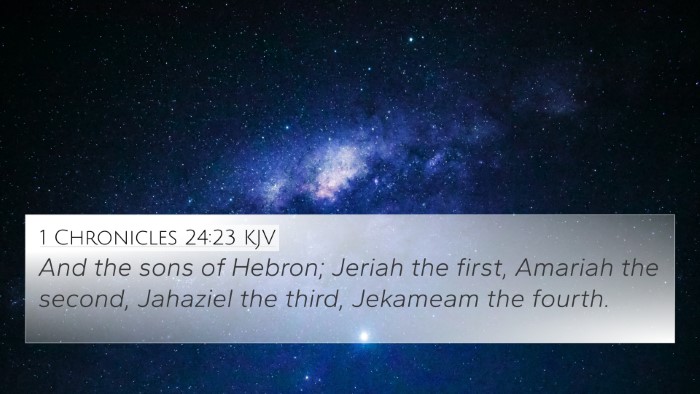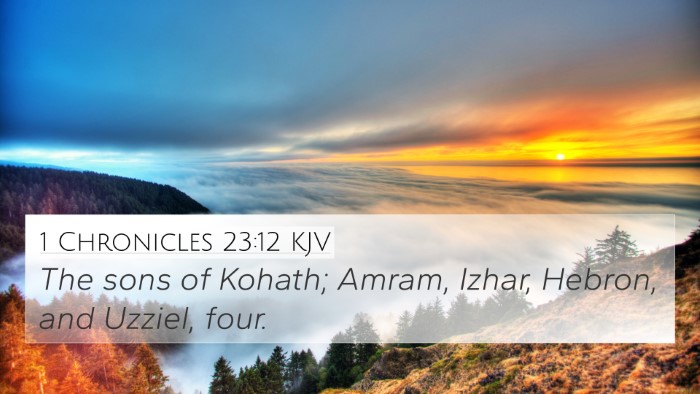Understanding 1 Chronicles 23:19
The verse 1 Chronicles 23:19 states, "The sons of Moses were Gershom and Eliezer." This simple line reveals significant aspects of the genealogical history of Israel, specifically linking to the priestly duties of the lineage of Moses.
Summary of Context
This verse appears within a larger account of the organization of the Levites and their responsibilities in the temple worship and service. After the establishment of the kingdom under David, there was a need to delineate roles and responsibilities among the tribes, particularly for the descendants of Aaron and Moses, who played crucial roles in temple worship.
Commentary Insights
-
Matthew Henry: Henry points out the importance of genealogies in establishing the legitimacy of the priestly line. The mention of Moses' sons emphasizes the continuity of God's covenant with His people and the significance of family lines in religious services.
-
Albert Barnes: Barnes highlights that Gershom and Eliezer represent distinct branches of Moses' lineage, illustrating God's faithfulness in continuing His work through the faithful remnant. Their roles were pivotal in facilitating the worship that would honor the Lord.
-
Adam Clarke: Clarke elaborates on the duties assigned to the Levites, mentioning that Moses' descendants were expected to assist in various aspects of temple worship. He emphasizes the responsibility of the Levites and the importance of their holy heritage.
Cross-References and Thematic Connections
This verse can be linked to several others that enrich its understanding and reflect broader biblical themes:
- Exodus 6:20: Discusses the lineage of Moses and Aaron.
- Numbers 3:4: Provides context regarding the deaths of Nadab and Abihu, sons of Aaron, and the significance of maintaining holy generations.
- Deuteronomy 10:6: Mentioning the connection of Moses' lineage while highlighting their journeys in the wilderness.
- 1 Chronicles 6:1-15: Further genealogical details about the descendants of Levi, showing their roles in worship.
- Hebrews 7:14: Explains Christ's lineage as from Judah, contrasting with the Aaronic priesthood and establishing a new covenant.
- 2 Timothy 1:5: Refers to the faith passed down through generations, paralleling the faith of Moses’ descendants.
- Matthew 22:40: The overarching law of love connects to the responsibilities within the Israelite community, including the priesthood.
The Role of Genealogy in Scripture
Genealogies serve to illustrate God's faithfulness across generations, establishing the legitimacy of priestly lines and confirming the continuity of His covenant. In 1 Chronicles 23:19, the mention of Moses' sons serves as a reminder of their important role in Israel's worship practices which prefigured the greater fulfillment in Christ.
Applications and Reflections
Understanding the genealogy of Moses encourages believers to recognize the longstanding commitment God holds towards His people. As disciples of Christ, we are called to reflect on our heritage of faith and the responsibilities we inherit in service to God.
Each lineage in the Bible offers a connection to its spiritual significance. For example, just as the Levites had their divinely sanctioned roles, Christians are also given spiritual gifts designed for the edification of the church (Ephesians 4:11-12).
Conclusion
1 Chronicles 23:19, though brief, is packed with theological significance that serves the overall narrative of the Bible. It connects genealogically, theologically, and practically with themes of service, faithfulness, and God's ongoing presence among His people. By engaging with this verse, readers can gain insights into the importance of communal worship and the historical context that informs our understanding of service in faith today.
Further Study Considerations
Studying genealogies may seem tedious, but they are crucial in understanding how God orchestrates His sovereign purposes through history. For deeper insights:
- Utilize a Bible concordance to explore connections between similar themes.
- Engage in cross-reference Bible study to find thematic ties.
- Incorporate Bible cross-reference guides during personal study.
- Analyze Bible verses that relate to each other through a comprehensive approach.
